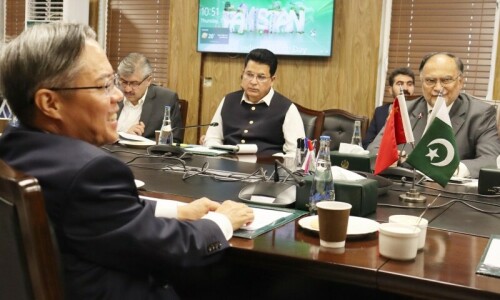THE developing Muslim nations need to ease the curbs on cross-broader movement of labour, for it works for all, home economy as well as recipient country of migrant workers.
The underplayed side of agreed ten-year roadmap of co-operation at the D8 Summit includes facilitation of manpower exchange among members. It has potential to influence the very dynamics of globalisation and liberalisation for the wider developing world by the success of carefully managed workers exchange plans to wriggle out of economic stress by prominent Muslim countries.
It is good for labour-abundant home economy as it could ease the problem of unemployed youth besides lending support, among many other factors, to economy through workers remittances. It could be a boon for the recipient country that would only attract the type of manpower for which there is market at comparatively lower cost besides increasing the drive in labour force to improve their productivity because of higher competition in the job market.
“Free mobility of labour is a distant dream. More relaxed rules to facilitate manpower movement across border suits most developing countries abundant in human resources. The resistance of the manpower scarce West towards equalisation that could eventually reduce their level of influence in the world is understandable”, said a trade expert.
The lack of enthusiasm in the East and the South that stands to gain from any relaxation in rules that leads to easier cross-border labour mobility cannot be explained if their perceived and real dependence on the West is set aside.
Beside other benefits including better inflows of remittances to home country, this could transform their economies by transfer of expertise and more gainful utilisation of the key factor of production that has so far been treated more as a liability than an asset.
The capital abundant countries of the West and multilateral economic forums have pushed the agenda of free cross-border movement of capital and value-added goods. Their liberalism, however, covers activities and subjects where they have an edge over the developing world. When it comes to free mobility of labour, they do not mind switching from their liberal to conservative streak.
The developing world, their ideologues and some international labour bodies have articulated their views on the issue but even at theoretical level it has been treated more as rhetoric counterpoint to capital mobility for which the West has been keen for capital needs new areas to grow and multiply.
“Malaysia can help the rest by exporting their expertise in food and alternative energy to countries such as Pakistan where the food industry has yet to develop despite huge agriculture base and high percentage of wastage because of absence of supporting facilities”, a Malaysian senior private sector executive preparing to introduce Halal food business in Pakistan told Dawn.
“Pakistan has good expertise in services such as banking and telecommunications and could assist Muslim brotherly nations left behind in the field by exporting middle cadre in banking and related financial field to nation interested”, he added.
“Iran has highly developed infrastructure and could supplement other nations’ efforts in the field of energy and infrastructure. So on and so forth”, the elderly business tycoon made his point.
All they need is to identify strength of each of the eight nations and complement each other in an arrangement that is mutually beneficial. However, being a new dimension of closer economic relations it would require unity of purpose, mutual trust and political will to cross over the hurdles in making the arrangement work.
“A lot of hard work must have gone into preparing a detailed common programme of economic co-operation for a loose regional grouping held together by a weak thread of faith”, said a Bangladeshi trade official commenting on the roadmap.
Eight Muslim developing nations in their joint declaration at the conclusion of the D8 Summit in Kuala Lumpur adopted a 10-year roadmap of economic cooperation. Beside routine statements of vision and objective the green document of the roadmap contains commitment by the D8 nations in pursuing co-operation in 14 economic fields.
These are: trade, trade facilitation, investment, industrial co-operation and standards, small- and medium-sized enterprises, tourism, finance, transportation, telecommunications and IT, science, technology and innovation, energy and minerals, agriculture and forestry, enhance private sector involvement and finally co-operation and joint approaches in international and regional issues.
It advocates negotiation of another agreement to address issues of non-tariff in the region. These nations committed themselves to establish a D8 database of non-tariff measures and work programme for their removal.
There are number of other highly innovative initiatives such as Common Seed Bank commissioning of investment barometer studies, mutual recognition on standards and conformity assessment, collective tourism packages, introduction of D8 Heritage awards, etc.
According to information gathered in Kuala Lumpur from officials of relevant government departments and ministries of participating nations (Malaysia, Indonesia, Bangladesh, Pakistan, Iran, Turkey, Egypt and Nigeria) they exchanged visits and positions on multifarious trade and economic issues based on their assessment of challenges before the draft plan was finalised.
“Over the past one year (2007), we overstretched ourselves to accommodate concerns of all member nations and develop a generic document that more clearly defines objectives and scope of D8 and give an action plan with specific milestones to facilitate monitoring and evaluation of progress”, a member of Indonesian delegation told Dawn outside the conference hall where the summit was in session behind the closed doors.
“Evolving a co-operation framework where diversified viewpoints could converge was not a mean achievement in itself. Now that we have come this far we hope that eight of most promising developing Muslim nations would not only leverage it to their advantage to achieve the defined targets but make up for the past lost decade when these nations failed to translate the goodwill to calculable economic gains”, said a Malaysian diplomat pretending to be enthusiastic over the future of D8 that would be headed by the country for the next two years.
“ To me it is an unnatural grouping of nations spread over three continents with divergent views over everything under the sun. Keeping the track records of the first ten years from 1996-2006 in view when it hardly survived, I see no reason to be optimistic about its future”, said an Iranian delegate commenting on the future of the regional trade bloc.
Prior to the summit, Malaysia expressed hope that the food and fuel shortages will be discussed with particular focus on oil price hike Iran responded rather harshly the next day as reported by media rejecting the proposal stressing to stay focused on the task of enhancing trade in developing Muslim nations.
“These agreements are neither sacred nor an end in themselves. If you are short of exportable surpluses the opportunity cost of the FTA would be higher as it would increase the inflow but supply side constraints would not let the country capitalise on market access concessions. Pakistan needs to be more alert to promote its interest. If signing on dotted line would have been enough, the country’s trade balance wouldn’t have worsened despite signing of several free trade agreements”, said a trade expert with wide exposure in multilateral and bilateral economic forums.














































Dear visitor, the comments section is undergoing an overhaul and will return soon.